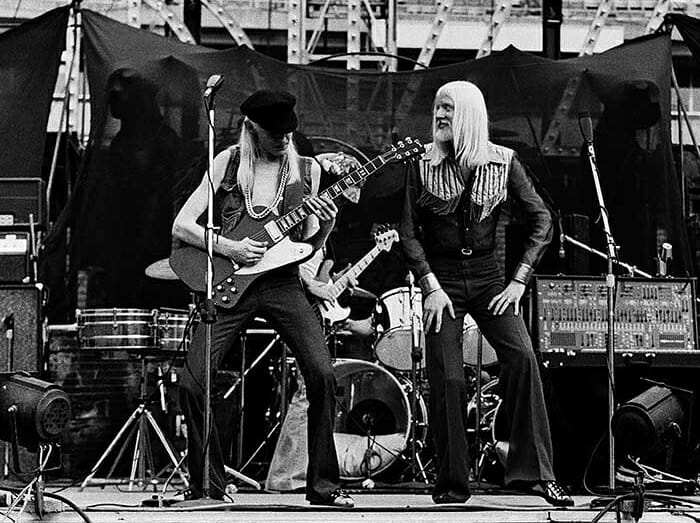Blues Route: Edgar Winter Honors ‘Brother Johnny’

photo credit: Rick Diamond
***
It took Edgar Winter years to come around to the idea of releasing a tribute album for his older brother, the great blues-rock guitarist Johnny Winter, who died at age 70 in 2014. “Johnny’s passing was very unexpected,” the 75-year-old multi-instrumentalist says. “I had been approached by several labels with the idea of a tribute album [soon after Johnny’s death], but it just didn’t feel right to me. I wasn’t ready at that time. More than that, it felt like people sensing an obvious business opportunity—‘Oh, Johnny Winter—let’s do a tribute.’”
Edgar eventually agreed to honor his sibling—on his own terms. “I spent years not making the record and, finally, I was talking to my wife, Monique, and she said, ‘Of course you should do it,”’ he says. “You owe that acknowledgment to your brother. You owe it to yourself and to the world.’”
The result, Brother Johnny, was released in April by Quarto Valley Records. The compilation features songs written by or associated with Johnny, performed by Edgar and an all-star cast that includes Joe Walsh, Ringo Starr, Derek Trucks, Billy Gibbons, Steve Lukather, Michael McDonald, Joe Bonamassa and many others. Among the tracks reworked for the tribute are Johnny Winter blues favorites like “Still Alive and Well,” “I’m Yours and I’m Hers” and “Lone Star Blues”—the latter featuring only Keb’ Mo’ and Edgar—as well as rock classics like “Highway 61 Revisited,” “Jumpin’ Jack Flash” and Chuck Berry’s “Johnny B. Goode,” all highlights of any Johnny Winter concert.
“Stranger,” originally on 1974’s John Dawson Winter III, features a one-time-only collective including Starr, Walsh and McDonald, while “Rock and Roll Hoochie Koo,” the Rick Derringer composition from 1970’s Johnny Winter And, boasts a raging guitar solo by Lukather. Edgar’s keyboards and vocals are dominant throughout the album, and he even joins the horn section on a stunning cover of “Drown in My Own Tears,” a blues ballad made famous by Ray Charles and included on Johnny’s self-titled debut album for Columbia Records in 1969. Edgar, who had played piano on the original, also picks up the saxophone this time around.
“Johnny has always been my all-time musical hero and, if it weren’t for him, I certainly wouldn’t be in the position I am today,” he says. In fact, Edgar readily acknowledges that it was Johnny who introduced him to the live-music world, inviting the younger Winter to join him onstage at a time when Johnny was just emerging outside of the brothers’ native Texas. “Nobody even knew Johnny had a brother,” Edgar recalls, “and he’d say, ‘Now, I’m going to bring up my little brother Edgar.’ Oh, there’s another one?!”
By “another one,” Edgar is not only referring to the fact that there were two Winters out there making music. “He showed me something that I never would have thought of,” Edgar says. “Both being albino, we had a different mindset. We shared a worldview that nobody else really had. Albinism is pretty rare. I just sort of ignored it and withdrew into my world of music, but he turned it around. Because of his unique look, he made it work for him. He actually showed me that being albino can be cool.”
Looking back, Edgar believes that one particular gig truly brought him into the spotlight and changed his life—Woodstock. Johnny asked his brother to share the stage with him at the game-changing 1969 festival, and Edgar still remembers every detail. “We flew in by helicopter, and the first thing that struck me was the vibe,” Edgar says. “There was a feeling of unity—the feeling that we were part of something bigger than a festival, that we could make a difference. We could maybe really change the world. I’d never really experienced anything like that. It was transfiguring, an epiphany. I found myself looking out over this endless sea of humanity, as far as the eye could see. I said, ‘How did I get here? What am I doing here? This is so surreal. This can’t really be happening.’ And from that point on, it made me realize that music could be so much more than just my own personal, private escape world.”
In 1970, Edgar Winter released his own debut album, Entrance, and, within a few years, he had become a star— logging a No. 1 hit single, “Frankenstein,” in 1973, and reaching the Top 20 with “Free Ride” several months later. At that time, he says, “I had no desire to be famous. I just loved music in and of itself. I loved the beauty of chords, harmony, rhythm. I just wanted to become a better musician. I thought of myself as an instrumentalist and a serious musician. Thankfully, I’ve gotten over that.”
Surprisingly, Edgar and Johnny didn’t record all that much together—there was some collaboration in the early days and a 1976 duets album, Together: Edgar Winter and Johnny Winter Live. Mostly, though, they flew in parallel orbits. “Johnny and I had such totally different approaches to music,” Edgar says. “Johnny reached out to the world with his music. He had that drive to be somebody, to make something of himself. And there’s nothing wrong with that. He was the extrovert and I was the introvert. I withdrew into my own personal, private world. For me, it was a journey of self-discovery, an inward journey.”
Now, with Brother Johnny, Edgar—who is returning to the road with Ringo Starr and His All-Starr Band this spring and summer after a long hiatus— has finally made a definitive statement about the greatest influence on his life and work. “I tried to make the album that I think Johnny would have wanted me to make,” he says, “and it was a totally joyous, uplifting, inspirational experience.”



















